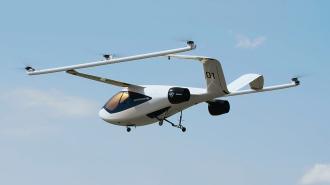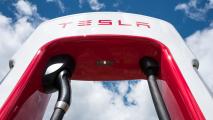German company Volocopter has just completed the first test flight of its latest air taxi design — the second prototype of what will ultimately be a fleet of autonomous, self-flying aircraft.
Hailing air taxis: By 2050, the percentage of the world population living in cities is expected to increase from the current 55% to nearly 70%, which means the traffic congestion plaguing many cities is likely to get worse.
Many companies are now developing electric vertical takeoff and landing (eVTOL) vehicles to skip right over crowded surface streets. These small electric aircraft are designed to transport passengers on-demand the same way taxis and rideshares do today.
What’s new? Rather than developing one eVTOL, Volocopter is developing several to suit different types of trips, including the VoloCity, a two-seater designed for intracity routes.
That craft completed its maiden flight in December 2021, and now, Volocopter has announced that another of its air taxis — the VoloConnect — completed its first flight in May.
The VoloConnect is designed for trips between neighboring cities or cities and their suburbs.
The VoloConnect: The new design is a four-passenger eVTOL with flight speeds above 155 mph and a range of more than 60 miles. It’s designed for autonomous flight, meaning passengers won’t have to worry about making small talk with their pilots during trips.
Unlike the VoloCity, this eVTOL is designed for longer trips, from the suburbs into a city or between nearby cities — Volocopter says an example route might be Burbank, CA, to Huntington Beach, a distance of 47 miles.
The flight: The VoloConnect performed several maneuvers during its first brief test flight, which lasted for 2 minutes and 14 seconds.
In its first three test flights, the eVTOL flew forward and sideways at speeds up to 40 mph and 28 mph, respectively, and in the coming weeks, Volocopter expects to gradually expand the VoloConnect’s flight test envelope.
Looking ahead: Before any air taxis can carry passengers high above cities, regulators will need to figure out how to certify the vehicles and manage the airspace. Developers will then need to win the trust of a public that might prefer sitting in traffic to flying above it.
Volocopter doesn’t see those hurdles as insurmountable, though, and is planning to have the VoloCity ready for commercial service by 2024, with the VoloConnect following in 2026.
“Having a whole family of electric aircraft in the test flight phase is a pioneering feat … Volocopter is bringing these innovative designs off the ground, into the air, and then to cities worldwide!” said CEO Florian Reuter.
We’d love to hear from you! If you have a comment about this article or if you have a tip for a future Freethink story, please email us at tips@freethink.com.






